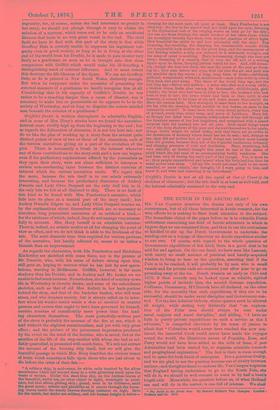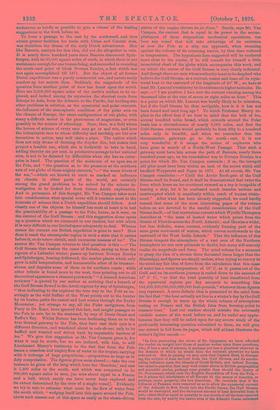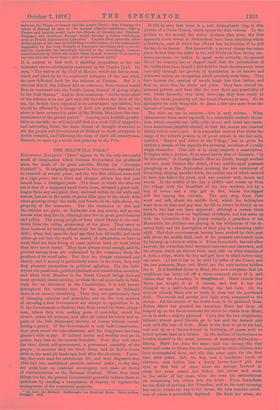THE DUTCH IN THE ARCTIC SEAS.* Mn. VAN CAMPEN deserves
the thanks not only of his owe countrymen, but of all those interested in Arctic research, for the wise efforts he is making to draw fresh attention to the subject. The immediate object of the pages before us is to rekindle Dutch enthusiasm concerning one field of heroic adventure in which in bygone days no one surpassed them, and then to use the enthusiiara so kindled to stir up the Dutch Government to undertake the sending-out on a voyage of discovery an Arctic expedition similar to our own. Of course, with regard to the whole question of Government expeditions of this kind, there is a good deal to be- said for and against On the one hand, we have men like Lamont, with surely no small amount of practical and hardly-acquired wisdom to bring to bear on the question, asserting that if the Pole is to be reached, it will probably be by men who in small vessels and for private ends are content year after year to go on pounding away at the ice. Dutch whalers as early as 1655 and 1670, if their records may be looked upon as reliable, sighted higher points of latitude than the second German expedition. Collinson, Ommanney, M'Clintock have all declared, on the other side, for the necessity that such expeditions, if they are to be successful, should be under naval discipline and Government con- trol. Yet the late Admiral Osborn, whose opinion must be allowed all weight, while stating very distinctly that "an explore, tion of the Polar area should always be sent under naval auspices and naval discipline," and adding, "I have no faith in purely private expeditions on such a service as this I advocate," is compelled elsewhere by his sense of justice to admit that "Columbus would never have reached the new con- tinent, the immortal Cook could never have made his voyages round the world, the illustrious names of Franklin, Ross, and Parry would not have been added to the rolls of fame, if past Admiralties had been waited for, to organise scientific research and geographical exploration." The fact is there is room enough and to spare for both kinds of enterprise. It is a generous rivalry, and we are glad to see the question become one of rivalry between nations ; and thoughinclined to endorse Mr. Van Campen's opinion that England having undertaken to go to the North Pole, she will do it, we should be well content to come in by half a boat's length only. Meanwhile, the question before us, of what Holland can and will do in the matter, is one full of interest. We shall
• The Dutch in the Ardie Seas. By Samuel Richard Van :Dampen. London : Tritium sod Co. 1876. endeavour as briefly as possible to give a résumé of the leading suggestions in the work before us.
To force a passage to the east by the northward, and thus obtain greater facilities for trade with China and Central Asia, was doubtless the dream of the early Dutch adventurers. Men like Barents, martyrs for this idea, did not die altogether in vain. It is nearly three hundred years since Barents discovered Spitz- bergen, with its 30,000 square miles of earth, in which there is not sustenance enough for one humanbeing, and succeeded in rounding the north-east point of bleak Novaya Zemlya, a feat which was riot again accomplished till 1871. But the object of all former Dutch expeditions was a purely commercial one, and nature rarely renders up her secrets thus. Suddenly the magnitude of the question from another point of view has burst upon the world. Here are 2,500,000 square miles of the earth's surface to be ex- plored, and locked among its mysteries the shortest route from Europe to Asia, from the Atlantic to the Pacific, but holding also other problems in solution, as the equatorial and polar currents, the influence of the atmospheric condition of the polar area on the climate of Europe, the exact configuration of our globe, with many a difficult secret in the phenomena of magnetism, or even possibly in the science of ethnology. Here, then, is a field where the heroes of science of every race may go in and win, and here the indomitable race to whom difficulty and hardship are but new incentives to action, may well claim a place. The nation which does not only dream of draining the Zuyder Zee, but makes that project a feasible one, which she is forthwith to take in hand, adding thereby six per cent, in productive acreage to her national area, is not to be daunted by difficulties when she has an enter- prise in hand. The question of the existence of an open sea at the Pole, and "the question as to the presence at the northern axis of our globe of those mighty currents,"—" the warm rivers of the sea,"—which are known to exert so marked an influence on climate in other parts of the world, are certainly among the grand problems to be solved by the minute in- vestigation to be looked for from future Arctic exploration. And in pursuance of this thought, Mr. Van Campen takes next into consideration what special route will it conduce most to the interests of science that a Dutch expedition should follow. And clearly one of the objects he himself has most at heart is to test the practicability of a passage to the Pole, borne, as it were, on the current of the Gulf Stream ; and this suggestion alone opens up a question which we commend to our readers, but with which it is very difficult in our limited space adequately to deal. Whence comes the current our British expedition is gone to meet ? How does it reach the circumpolar region in such a state that it carries before it, on its return circuit, such enormous massess of ice ? The answer Mr. Van Campen returns to that question is this :—" The Gulf Stream that washes the coast of Britain, saving us from the rigours of a Labrador winter, passes up between Novaya Zemlya and Spitzbergen, bearing driftwood, the marine plants which only grow in mild temperatures, and innumerable other of its treasure- stores, and deposits some of these on far northern coasts ; while other tribute is found more to the west, thus pointing out to all theoretical appearance a channel polewards." "A learned American r eviewer " is quoted by our author as noticing that a branch of the Gulf Stream flowed to the Arctic regions by way of Spitzbergen, "thus indicating to the explorer the true way to the Pole as un- erringly as the wild buffalo of the West points out to the hunter by its beaten paths the easiest and best routes through the Rocky Mountains ; yet strange to say, all the Polar navigators, from Parry to Dr. Kane, have ignored this fact, and sought passages to the Pole in vain far to the westward, by way of Davis Strait and Baffin's Bay. Whilst Nature has been beckoning them on to the true thermal gateway to the Pole, they have cast their eyes in a different direction, and wandered about in culs-de-sac, only to be baffled and wearied and driven back by impassable barriers of ice." We give this suggestion as Mr. Van Campen gives it, for what it may be worth, but we are inclined, with him, to add Lieutenant Maury's testimony to the fact that from the Pole issues a ceaseless and mighty flow of water to the tropics, carrying with it icebergs of huge proportions,—proportions so huge as to defy computation. The figures given seem absurd ;—take the one instance he gives of the berg which bore the 'Resolute,' and cast it 1,200 miles to the south, and which was computed to be -300,000 square miles in area, [an area about equal to a France and a half, which surely can have never been explored and its extent determined by the crew of a single vessel]. Evidently we try in vain to estimate what must be the flow of water from the south which, "wedging itself into this space around the Pole, ejects such masses out of this space as easily as the steam-driven piston of the engine throws its jet d'eatt." Surely, says Mr. Van Campen, the current that is equal in its power to the accom- plishment of these stupendous mechanical operations, can bear any vessel that will take advantage of its existence as near the Pole as a ship can approach, when steaming against the volume of its returning waters, by that time reduced
in temperature. The hypothesis here suggested will be rendered more clear to the reader, if he will consult for himself a little isometrical chart of the globe which accompanies this work, and on which the course of the Gulf Stream is very clearly indicated. And though there are men whose authority isnot to be despised who believe the Gulf Stream, as a current, ceases and loses all its equa- torial heat to the eastward of the longitude of 40° W., we have at
least Mr. Lamont's testimony to its existence in higherlatitudes. He says :—" I am positive I have seen the current running among the
thousand isles at the rate of seven or eight miles an hour." This is a point on which Mr. Lamont was hardly likely to be mistaken, but if the Gulf Stream be thus navigable, how is it it has not been found and used long ago ? To which Professor Maury re- plies to the effect that if we bear in mind that the belt of ice, several hundred miles broad, which extends around the Polar basin has a circumference of nearly 3,000 miles, and that the Gulf-Stream currents would probably be from fifty to a hundred miles only in breadth, and when we remember that the thermometric gateways go to the north - east, it is not very wonderful if it escape the notice of explorers who
have gone in search of a North-West Passage. That such a
gateway must have lain across the path of Barents, nearly three hundred years ago, on his roundabout way to Novaya Zemlya, is a point for which Mr. Van Campen contends ; if so, the intrepid old pilot must have been within an inch of the secret which still baulked Weyprecht and Payer in 1871. At all events, Mr. Van Campen concludes :—" Until the Arctic flood-gate of the Gulf Stream shall be found, and it shall be demonstrated that twice the force which bears an ice-continent onward as a toy is incapable of bearing a ship, let it be confessed much remains undone and unattempted which is manifestly within reach of human attain- ment." After what has been already suggested, we need hardly remark that some of the most interesting pages of the volume before us are devoted to the careful consideration of the Gulf
Stream itself,--of that mysterious current which Wyville Thompson describes as "the mass of heated water which pours from the
Straits of Florida across the North Atlantic ; and likewise a wider, but less definite, warm current, evidently forming part of the same great movement of waters, which curves northwards to the eastward of the West India Islands." That the influence of this Stream tempers the atmosphere of a vast area of the Northern hemisphere no one now pretends to doubt, but many will scarcely realise its magnitude and force. The mind refuses for a moment to grasp the idea of a stream three thousand times larger than the Mississippi, and figures are simply useless, when trying to convey to the mind any fair idea of force from the calculation that this mass of water has a mean temperature of 18° C. as it passes out of the Gulf, and on its northern journey is cooled down to the amount of 13° 5' C., "so that the total quantity of heat transferred from the equatorial regions per day amounts to something like 151,959,300,000,000,000,000 foot-pounds," whatever those figures may represent. A more definite idea is presented to the mind from the fact that "the heat actually set free in a winter's day by the Gulf Stream is enough to warm up the whole column of atmosphere resting on France and the British Isles from freezing-point to summer heat." Lest our readers should mistake the extremely
readable nature of the work before us, and be under any appre- hension that they will be called upon for any severe study of the profoundly interesting question submitted to them, we will give one extract in full from its pages, which will at least illustrate the writer's lighter moods :- "In thus presenting the views of Dr. Carpenter, we have afforded the reader an insight into those of another writer upon these questions, who, if less a man of science, is perhaps not loss a practical observer in the domain of which he treats than the eminent physicist we have referred to. But in passing we may note that Captain Bent, in discuss- ing the subject of heat derived from the Gulf Stream, and its amelio- rating influence upon the climate of Great Britain, and indeed Europe, has raised a question that may well create alarm in British geographical and scientific circles, perhaps even greater than should the theory of Dr. Petermann, which cuts the English Expedition off from the Pole,— for it places the inhabitants of all Europe at the mercy of America, or perhaps, more properly, the two Americas. He contends that if the Isthmus of Panama were removed so as to allow the equatorial current of the Atlantic to flow freely into the Pacific Ocean, the Gulf Stream would be destroyed, and the enormous amount of heat derivable from it lost,—described as equal in quantity to one-fourth of all the heat received from the sun, by nearly the entire area of the Atlantic Ooean embraced
between the Tropic of Cancer and the Arctic, Circle; thus bringing the whole of Europe at once to 'its normal climatic condition,—that is, France and Austria would have the climate of Canada, and England, Germany, and Northern Europe would become a frozen wilderness, such as British America and Labrador: Captain Bent naturally refers to this phase of the case as forbidding to reflect upon, for the inhumanity suggested by the very thought of America's exercising such a power; and Dr. Carpenter has amusingly alluded to the exceedingly humane considerations by which she might deem herself deterred from meting out this dire fate to so large a part of the civilised world."
It is curious to find such a startling proposition as the one indicated above substantially confirmed by Sir Charles LyelL He says, "The waters of the Gulf of Mexico, which are driven west- ward, and piled up by the continued influence of the east wind, are now deflected back by the isthmus of Panama. But it is obvious that if this isthmus had no existence, these waters would flow on westward into the Pacific Ocean, instead of giving origin to the Gulf Stream." And he then continues, "As the water-shed of the isthmus is in one part only 250 feet above the level of the sea, the breach here supposed is no extravagant speculation, but would be effected by a change of level not greater than we can show to have occurred in parts of the British Isles since the com- mencement of the glacial period." Leaving such horrible possibi- lities on one side, we will only add that in a work full of suggestive and interesting detail, the main thread of thought is anxiety to stir the people and Government of Holland to fresh enterprise in Arctic research, and following the route of their old countryman, Barents, to open up a north-east pathway to the Pole.




































 Previous page
Previous page